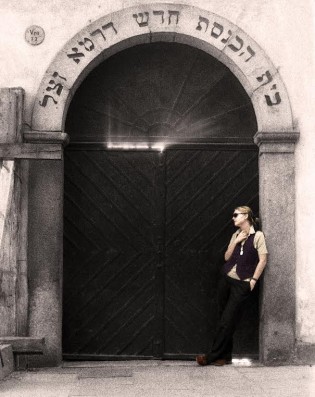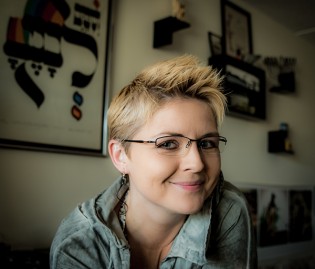We Are All in This Sukkah Together

I will always be a Polish Jew, no matter how fluid my Jewish identity may be.
by Katka Reszke
As I ran along Charles River during the recent holiday of Sukkot, I came across a rather shabby looking sukkah. It displayed all the signs of having fallen victim to the impressive rainstorm, which had soaked much of the Boston area the previous day. The roof of the sukkah had collapsed to the ground, and the delicate walls appeared anything but stable. But there it was – a sukkah nonetheless. Accidentally running across one of those would be somewhat unlikely where I come from. Sukkot is my favorite Jewish holiday, and Poland is where I am from.
In my life, I have been lucky to have traveled extensively. The Jewish cosmopolitan in me has always been fascinated with the diversity of and the differences among Jewish communities in different cities, countries, continents, and times. Over the years, I have become more and more interested in how the multitude of languages and narratives of worldwide Jews presents itself against the grand narrative, or what I see as a number of metanarratives – a multitude of stories we tell ourselves and each other in an attempt to make sense of the Jewish experience. As it turns out, my focus has been captured by the narratives that appear to make least sense – stories of unlikely survival, unexpected returns, and extraordinary discoveries.
Most recently, I have been trying to make sense of stories of Polish women who discover their Jewish roots following an irrational belief, intuition, or hunch about their ancestral background. Before a series of uncovered family secrets revealed my own lineage, I, too, had nothing more than an unrelenting hunch, which made me feel Jewish before I actually knew I was. The Polish Jewish community I joined in the mid-90s was, and continues to be, one particularly rich with those mind-boggling tales, which individually present an array of diverse experiences of Jewish identity, but together account for why Jewish life continues in Poland today.
I have now lived in the U.S. for eight years. Prior to this, I spent nearly five years in Israel. Throughout this time, I have consistently traveled back to Poland and spent significant amounts of time there. From a professional point of view, Jewish Poland has become the central theme in my research, writing, and documentary filmmaking. From a personal point of view, I have often been heard saying that, having lived in places as “Jewish” as Jerusalem and New York, I still never feel more Jewish than I do in Poland.
However, moving to America brought me to a critical self-realization. I learned that, however fluid and ever-changing my Jewish identity may be – as I believe is the nature of all identities – I will always be a Polish Jew. It is here that I’ve become more aware of the complexity of the Polish Jewish experience, and it has become a central feature of my Jewish identity to try to translate that experience. In other words, in America I feel perpetually compelled, both personally and professionally, to bring the often-perplexing Polish Jewish stories to light.
In 1908, S. Ansky, the celebrated Russian Yiddish writer and author of “The Dybbuk,” declared: “There is no other people like the Jewish people, that talks about itself so much, but knows itself so little.” I believe this is still true today. Much can be lost in translation as we listen to the plurality of Jewish voices across the globe, but my Jewish identity realizes itself precisely through the never-ending process of learning.
As I migrate in space and across experiences – as a human, as a woman, as a Jew – my life and work continue to be an exercise in recognizing relevance. While I appreciate the likelihood of running across a sukkah in suburban Massachusetts in the year 2015, my Jewishness is forever of the less likely kind. It has my mind traveling back to the Old Country, where more and more Sukkot booths are raised every year, despite the conviction of so many that all Jews in today’s Poland would probably fit into a single sukkah… And I am challenged by how unlikely it still seems to others as it does to me, that – to paraphrase Leonard Cohen – tents of shelter are raised in Poland in 2015, “though every thread is torn.”
But on a rainy Sukkot day, my mind takes me also to the thousands of other migrants, wanderers, exiles, and refugees – those in today’s Europe and beyond – who will not have the tent of shelter extended over them, and this is a challenge of a completely different kind.
As we wander through the desert with little sense of direction, and as we build our fragile and permeable homes in our own idiosyncratic ways, I wonder about how we interact, interrelate, and find relevance across boundaries and borders. I wonder about how we choose to share our shelters with others and/or how we hope for others to share theirs with us.
Ultimately, on a sunny Sukkot day, I like to think that we are all in this sukkah together. At the same time, I believe that we can choose to dwell in more than one sukkah at a time. I know I do. On the Feast of Booths, known as the Season of Our Joy, we read Kohelet, otherwise known as Ecclesiastes, who arduously professes, “all is vanity and a chasing after the wind.” This is not all that easy to refute, but sometimes, and with a little bit of luck, we get to share the tent of shelter in such a way that makes it clear that all may be vanity, but, then again, some things are not.
About the Author
 Katka Reszke is a writer, documentary filmmaker, photographer, and researcher in Jewish history, culture, and identity. Katka holds a doctorate in Jewish education from the Hebrew University of Jerusalem and is the author of Return of the Jew: Identity Narratives of the Third Post-Holocaust Generation of Jews in Poland (2013). Recently, she served as chief screenwriter of the acclaimed film Karski & The Lords of Humanity (2015). During her residency at HBI, Katka is developing her research-creation project “The Meshugene Effect,” a book and an experimental documentary featuring personal narratives of several Polish women who embark on a pursuit of Jewish identity following an irrational feeling, a hunch, about being of Jewish descent. Visit www.katkareszke.com.
Katka Reszke is a writer, documentary filmmaker, photographer, and researcher in Jewish history, culture, and identity. Katka holds a doctorate in Jewish education from the Hebrew University of Jerusalem and is the author of Return of the Jew: Identity Narratives of the Third Post-Holocaust Generation of Jews in Poland (2013). Recently, she served as chief screenwriter of the acclaimed film Karski & The Lords of Humanity (2015). During her residency at HBI, Katka is developing her research-creation project “The Meshugene Effect,” a book and an experimental documentary featuring personal narratives of several Polish women who embark on a pursuit of Jewish identity following an irrational feeling, a hunch, about being of Jewish descent. Visit www.katkareszke.com.
There are no comments yet, add one below.






Leave a Comment